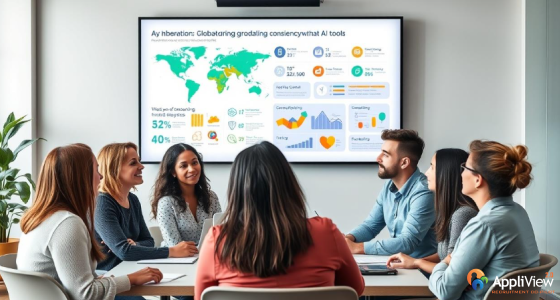The Role of AI in Employee Onboarding and Retention
April 4, 2025

AI is transforming employee onboarding and retention by delivering personalized, efficient, and scalable experiences. From automating administrative tasks to creating tailored training paths, AI accelerates productivity and ensures consistency across global teams. It also enhances retention by predicting turnover risks, enabling proactive engagement, and offering individualized development plans. While challenges like data privacy and human connection remain, future AI trends promise deeper emotional intelligence and immersive onboarding.
AI-Powered Onboarding

AI enables highly personalized onboarding experiences tailored to each new hire’s background, skills, and role. By analyzing individual profiles, AI can create customized learning paths and training modules, ensuring that employees receive relevant information and resources from day one.
Automated Efficiency

AI streamlines administrative tasks, reducing the time and effort required for onboarding. This includes automating paperwork and document processing, setting up accounts and system access, providing instant answers to common questions via chatbots, and creating personalized welcome videos and materials.
Consistency and Scalability

AI ensures consistent delivery of onboarding information across all locations and time zones, particularly beneficial for companies with remote or global workforces. It also allows organizations to scale their onboarding processes efficiently, maintaining quality while reducing the burden on HR teams.
Accelerated Time-to-Productivity

By providing tailored training and resources, AI-driven onboarding can help new hires reach peak performance up to 40% faster than traditional methods.
AI in Employee Retention

AI analyzes vast amounts of employee data to identify patterns and predict potential turnover risks. This allows organizations to take proactive measures to address issues before they lead to resignations.
Personalized Development

AI creates individualized learning and development plans based on an employee’s skills, interests, and career aspirations. This tailored approach to growth opportunities can significantly enhance job satisfaction and loyalty.
Real-time Feedback and Engagement

AI-powered tools can continuously gauge employee sentiment through natural language processing and sentiment analysis. This enables organizations to address concerns promptly and maintain high levels of engagement.
Challenges and Considerations

While AI offers significant benefits, organizations must also address potential challenges: – Ensuring data privacy and security – Maintaining a human touch in the onboarding process – Addressing potential employee concerns about AI replacing human interactions – Integrating AI systems with existing HR technologies.
Future Trends

As AI technology continues to evolve, we can expect to see: – More sophisticated emotional AI that can assess and respond to employee emotional states – AI-powered virtual reality simulations for immersive onboarding experiences – Advanced predictive models that can forecast career trajectories and suggest optimal development paths.
Conclusion
AI is revolutionizing employee onboarding and retention by offering personalized, efficient, and data-driven solutions. As organizations continue to adopt and refine these technologies, we can expect to see significant improvements in employee satisfaction, productivity, and long-term retention.
